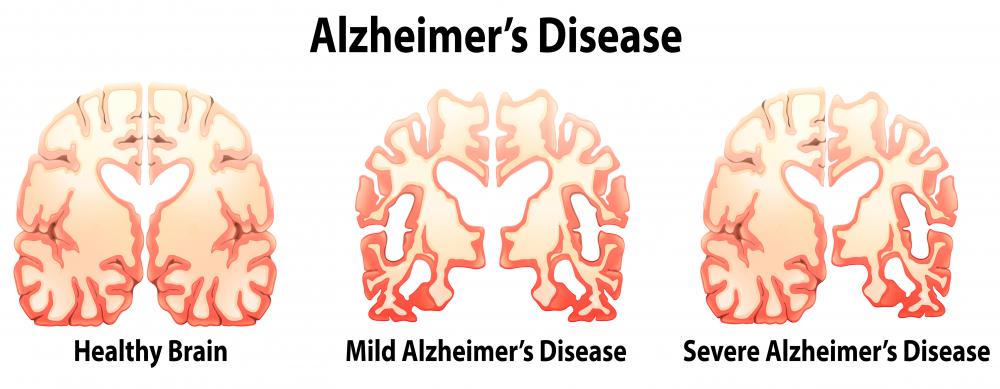At WiseGEEK, we're committed to delivering accurate, trustworthy information. Our expert-authored content is rigorously fact-checked and sourced from credible authorities. Discover how we uphold the highest standards in providing you with reliable knowledge.
What are Alzheimer's Hallucinations?
Alzheimer's hallucinations are sensory disturbances associated with advanced cases of Alzheimer's disease, although not all patients will develop hallucinations. In patients with hallucinations, people have sensory experiences that feel real — sometimes more real than the surrounding environment — and may also be very detailed. There are a number of ways to address Alzheimer's hallucinations, depending the progression of a patient's case and the type of hallucinations being experienced.
Most hallucinations associated with Alzheimer's disease are visual and auditory. People may see things like deceased family members, animals, and so forth, and can hear music, voices, and other sounds. It is also possible to experience other sensory disturbances, sometimes in concert; someone may smell flowers and see roses, for example, or hear an animal and feel the sensation of fur or a damp nose.

This progressive neurological disease can lead to confusion and disorientation in patients. Simply correcting a patient is not usually recommended, as this can be upsetting and may lead to behavioral problems. People have different approaches to managing Alzheimer's hallucinations. If they are pleasant, caregivers may be told to go along with the Alzheimer's hallucinations or to avoid actively challenging them. If they are unpleasant, offering reassurance can help, and some patients benefit from having their caregivers engage with the content of the hallucination. For example, if someone sees a snake in the bed, the caregiver can shoo the snake away or use a broom to “move” the snake to reassure the patient.

Providing a redirection during Alzheimer's hallucinations can also be helpful. Some patients become combative when their caregivers attempt to provide distractions, however, so people should be careful about how and when they redirect. Acknowledging the hallucination rather than dismissing it before moving on with a distraction is recommended. Thus, for example, a caregiver might say, “Oh, isn't the music lovely! Now, could you help with with ...” to refocus the patient's attention. In the case of a frightening hallucination, telling the patient that the environment is safe is also recommended to reduce agitation.

The development of hallucinations can be a sign of increasing cognitive dysfunction. When patients start hallucinating, an evaluation by a neurologist may be a good idea. There may also be medications available to address traumatic, upsetting, or scary hallucinations to make the patient feel more comfortable. Each patient is different and an individualized treatment plan should be developed to address concerns associated with advancing Alzheimer's disease.
AS FEATURED ON:
AS FEATURED ON:
















Discussion Comments
@simrin-- You might want to look into his medications. From what I understand, some of the medications used in the treatment of Alzheimer's could also cause hallucinations as a side effect.
@simrin-- My grandmother is in the same situation as your grandfather right now. She lives with my parents and my parents are struggling with it.
I actually don't think that she's hallucinating in the usual sense. She's hallucinating but about her old memories. For example, she remembers my dad as a young boy and talks about him as if he is there right now as a child and no an adult. It's weird.
My grandfather has Alzheimer's and about three months ago, he started having hallucinations in addition to the dementia symptoms. We've seen his doctor about it several times and he urges us to play along as well as we can. My grandfather has been put on more medications now but it's not making a difference. The problem with playing along is that, we can't do it all the time because he wants to go into other people's houses and things like that.
Does anyone else here have a family member with Alzheimer's hallucinations? How are you dealing with it? Have you found any methods that help?
Post your comments